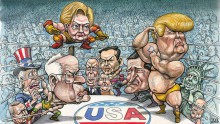The billionaire Donald Trump, who was expected to win the Iowa Republican caucus at the beginning of the US presidential election campaign, has quite unexpectedly suffered a defeat. He hoped to win by a 10-percent margin. Instead, the winner is Texas Senator Ted Cruz who polled 27.7 percent of the votes, 3.3 percent up on Trump. The one who came in third is Florida Senator Marco Rubio with 23.1 percent, a result better than observers expected.
Some observers immediately derided Trump, recalling his December 30, 2013, tweet: “No one remembers who comes in second.” When the results were announced, Trump congratulated Cruz on the victory, saying he was proud of second place. He promised to win the upcoming primaries in the state of New Hampshire nine days later.
In the Democratic caucus, the former US Secretary of State Hillary Clinton defeated Vermont Senator Bernie Sanders, who calls himself democratic socialist, by a mere 0.3 percent.
Andrew SELEE, Executive Vice President, Woodrow Wilson Center, Washington:
 “There are some underlying shifts in American society, some of them tied to global changes, which are driving voters’ unease and making them more open to populist candidates. One is the slow economic growth, in which average wages are not really increasing even though the economy has recovered from the 2008 recession. Another is the changing composition of American society, which has been driven by two decades of rapid immigration (even if this is relatively slow now).
“There are some underlying shifts in American society, some of them tied to global changes, which are driving voters’ unease and making them more open to populist candidates. One is the slow economic growth, in which average wages are not really increasing even though the economy has recovered from the 2008 recession. Another is the changing composition of American society, which has been driven by two decades of rapid immigration (even if this is relatively slow now).
And finally, the global system is becoming less predictable and US leadership, in a multipolar world, is no longer unchallenged. People feel unease in this world of shifting paradigms – slow growth, changing demographics, and uncertain role in the world – and some reach out to those who promise easy solutions to complex problems.
“It’s not clear that even if party leaders wanted to that they could stop candidates they don’t like, but in the past populist candidates have often lost favor with voters once the voting starts. We will see if that holds this year or not.”
Oleksandr TSVIETKOV, expert on the US, professor of the Diplomatic Academy of the Foreign Ministry of Ukraine, Kyiv:
 “After the latest Republican debate, which took place on January 28, billionaire Donald Trump has retained leadership, greater media attention and voter base. And this happened despite the fact that he refused to participate in the televised debates, at the same time hosting a charity event for veterans in just a few miles from the seventh debates’ location. One should add to this that Trump uses Twitter very effectively.
“After the latest Republican debate, which took place on January 28, billionaire Donald Trump has retained leadership, greater media attention and voter base. And this happened despite the fact that he refused to participate in the televised debates, at the same time hosting a charity event for veterans in just a few miles from the seventh debates’ location. One should add to this that Trump uses Twitter very effectively.
“All the attention of America and the world was focused on Iowa, where the caucus was held – the first qualifying stage of this year’s race for the nomination. This is called the caucus – the local election in each of the parties, Democratic and Republican, which lasts two hours. Then the primaries will be held in New Hampshire and gradually in every other state.
So, now the high-stake game has begun. But the caucus in Iowa is a litmus test, because it actually singles out the leaders of the parties, which will go ahead and then compete for the presidency.”
ON THE INTRIGUING OUTCOMES IN BOTH PARTIES
“It’s worth noting that the outcomes of caucus in both parties are still obscure. Among the Democrats, Clinton and Sanders are almost head to head. Clinton has more support among the Hispanic and Black demographics. Soon the primaries will be held in many southern states, and they will provide her with a superior position in terms of support on the party stage. But Sanders is a very good talker and orator. And through his speeches he wins the votes.
“Speaking of the GOP, their main concern is to deal with Trump and among themselves. And only then come migration, terrorism, and even further – the social issues.
“Since 12 million people are considered illegal immigrants in the US, this issue is raised fairly sharply. The fact is that the follow-ups of Trump – senators Ted Cruz and Mario Rubio – are sons of immigrants from Cuba. And it turns out that if they strongly criticize the illegal immigration, they would lose many votes in their support. Otherwise, their position would be rendered weaker compared to Trump’s.
“It appears that on Monday the caucuses in Iowa will name the leaders of the respective parties. The Democratic Party is likely to stay with the duo of Clinton and Sanders. Among the Republicans, a fierce struggle is yet being waged for one or two candidates to pass the barrier and join the three already mentioned at the next stage in New Hampshire primaries. That means the GOP will have a very severe competition this year. The election tension begins to rise in America as early as the first caucus and primaries take place.”
ON THE RISE OF POPULISM IN AMERICA
“By using the terms ‘populist’ and ‘populism’ we are playing with words. But populists do analyze the hottest issues for the United States. Each of these ‘populists’ has a lot of practical work behind their back. As a Senator, Clinton proposed or participated in the development of nearly a thousand bills.
“Ted Cruz is one of the most influential senators in the US Congress. Mario Rubio is one of the emerging talents in the senatorial political field.
“How can they not resort to popular rhetoric, if this were debates, in which they must be able to captivate the public? And the failure in discussions was the reason the third candidate in the Democratic Party could not raise his rating.
“And the popularity of Trump is explained very well by the fact that he has very good connections and is able to present himself. But at the same time he is indomitable, unpredictable, and sometimes gets carried away. The Republican Party would like to have a more controlled candidate, who meets the criteria of the Republican political group. Nevertheless, it is the American way of candidates’ expression.”
ON THE “AMERICAN NIGHTMARE” FOR EUROPE
“It is now too early to talk about the foreign policy of the contenders for the presidential nomination. After all, the important thing on these past and future debates is what the Americans think of their candidates. In addition to that, firstly, there is a party mechanism, and secondly, we are still far from the final results.
“Even Clinton is trying not to display her experience in foreign affairs too much. Because now it is the American issues that matter the most.
“This is generally typical of America, domestic problems come first. And at this stage a lot of them are being discussed.
“And the situation will be different when the cross-party debates will start between the candidates nominated at party congresses. Then the emphasis will be put on the external affairs. That is, America’s role in the world will be discussed at a later stage.
“Trump took Reagan’s motto and is trying to use the criteria of Reagan’s winning campaign, based on the general slogan that America should once again become stronger, to show its might. And this applies to everything, including military operations abroad or on the construction of the wall on the border.
“That is, he wants to appear a person who has recipes and strong responses to strong challenges. But it is too early to tell whether he is good at this, since the substantive issues are reserved for later.”
“AMERICANS LIKE WINNERS”
“In summary, it should be noted that the caucus in Iowa is actually the last starting position in this year’s marathon. And thus some of the reactions across the world are mixed. Everything is possible, and so far nothing can be ruled out. But in Iowa everything is becoming clearer. In 2008, Clinton lost primaries in that state, and Obama came out on top. And now for Clinton there is an echo of her past defeat that may affect this year’s result. The sky is not clear for her.
“The situation will develop with more momentum after the Iowa caucus. Americans like winners, and the one who shows better results will immediately attract more followers.”








